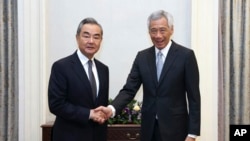Chinese Foreign Minister Wang Yi was in Singapore on Thursday and Friday holding talks with the country’s leaders aimed at deepening ties with the Southeast Asian nation.
Wang’s visit was the first stop on a tour that also includes Malaysia and Cambodia. It is a chance to “strengthen strategic communication” with the three countries, according to China’s Foreign Affairs Ministry.
Wang met with Prime Minister Lee Hsein Loong and current Deputy Prime Minister Lawrence Wong, along with Foreign Minister Vivian Balakrishnan.
According to Beijing, the meetings resulted in pledges for further cooperation in economic and trade matters, as well as cultural exchanges and tourism. The two sides also will resume a schedule of direct flights that previously existed between Singapore and China before the COVID-19 pandemic closed down international travel.
The meetings follow talks earlier this year between the Singaporean prime minister and Chinese President Xi Jinping in Beijing in which they pledged to elevate diplomatic relations.
The two countries share close ties financially and culturally.
“Singapore is a big economic partner, and it’s the largest foreign investor in China,” Singapore-based political scientist Ian Chong said. “Politically, I think China sees Singapore as a place that they can work with because of the more controlled social and political state in Singapore.
“They [China] probably do not expect to receive too many public displays of disquiet that might prove embarrassing,” Chong said.
Between China and U.S.
While Singapore’s relations with China strengthen, the nation walks a tightrope as a close U.S. ally.
This diplomatic positioning gives it an elevated position in global affairs, as was shown when it hosted a meeting between former U.S. President Donald Trump and North Korean leader Kim Jong Un.
Some are calling for Singapore to use that middleman leverage.
“In today's climate, it's important for the Chinese to hear from Singapore’s political leaders on their views of where things are between the USA and China, and for the Chinese side to tell officials in Singapore where they stand as well,” said independent analyst Song Seng Wun.
Singapore’s strong relations with China can also be explained by the ethnic makeup of the country.
Almost three quarters of the population have a Chinese background, and Singapore is the only country outside of mainland China, Hong Kong, Taiwan and Macau that has a majority-Chinese population.
While this leads to close cultural ties between the two countries, it has also caused concern about the potential for Chinese influence to infiltrate the city-state.
Positive view of China
A 2022 study by a Taiwan-based think tank Doublethink Lab ranked Singapore second in the world for countries that are most influenced by China. A survey conducted in 19 countries last year by the Pew Research Center found that Singapore was one of only three nations where more people had a positive view of China and Xi than negative.
The issue is not lost on Singapore’s leaders, who enacted a law in late 2021 aimed at counteracting foreign interference. Moreover, in his Chinese-language address to the nation at last year's National Day rally, Lee warned that his country “must actively guard against hostile foreign influence operations, regardless of where they originate.”
But with such close links to China, particularly among the older generation of Singaporeans, fears around potential Chinese interference are likely to linger.
“Efforts to appeal to that ethnicity and culture could — if taken too far — be divisive for a society like Singapore,” Chong said.
The city-state is increasingly seen as a safe place to house money, with a sharp rise in the number of families setting up private offices as entities to manage wealth.
The Monetary Authority of Singapore told Voice of America that these offices numbered 1,100 at the end of last year, compared with just 400 in 2020.
“Over recent years, more Chinese are using the neutral city-state of Singapore as a place to do business and trade with the rest of the world,” Song said. “It’s particularly more important now, given how U.S.-China relations are.”
South China Sea tensions
Wang’s visit to Southeast Asia comes as tensions mount between China and the Philippines over the disputed South China Sea.
Manila has accused the Chinese coast guard of using a water cannon to stop a Philippine vessel from delivering supplies to troops stationed aboard a grounded warship.
The World War II ship is now at the center of a new diplomatic spat between the nations, with Beijing claiming Manila had promised to remove the stricken ship — something the Philippines denies.
That is an extra motivation for this trip, political analyst Chong said. “Wang Yi will probably be eager to show that China has good relations with Southeast Asia in general, given some of the tensions that have risen.”
After concluding his talks in Singapore, Wang Yi headed north to meet with Malaysian Prime Minister Anwar Ibrahim before finishing his trip in Cambodia on Saturday.




